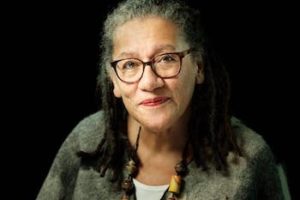
Gloria Wekker
*Gloria Wekker was born on this date in 1950. She is an Afro Surinamese Dutch gender activist, emeritus professor, and writer.
Gloria Daisy Wekker was born in Paramaribo, Suriname. Her family migrated to the Netherlands when she was a one-year-old infant and lived in a neighborhood in Amsterdam that had formerly been predominantly Jewish before World War I. She returned to Amsterdam in the 1970s and became an active member of the Afro-European Women's Movement.
Wekker earned a master's degree in cultural anthropology from the University of Amsterdam in 1981 and began working in various governmental agencies in Amsterdam, including the Ministry of Health, Welfare, and Culture on Ethnic Minorities' Affairs and the Ministry of Social Affairs and Employment. In 1984, she became a founding member of "Sister Outsider," an Amsterdam-based literary circle for lesbian black women named after the work by Audre Lorde. In 1987, she was a Policy Associate in the Office for the Coordination of Ethnic Minorities' Affairs. In 1992, Wekker earned her doctorate at the University of California, Los Angeles, with a thesis on the sexuality and subjectivity of Afro-Surinamese women.
In 2001, she was the Aletta chair of the Department of Women's Studies at Utrecht University. Her work focuses on the intersections of colonialism, racism, white privilege, feminist theory, lesbian theory, and women in the Caribbean. Her work has earned her the title of "Holland's Angela Davis" as she has forced the Dutch to examine their alleged ingrained stereotypes and attitudes towards racism and patriarchy. She has led a debate questioning the racist nature of such iconic images in Dutch tradition, such as Sinterklaas (Santa Claus) helpers who are often depicted in blackface golliwogs known as Zwarte Piet (Black Pete), and the imagery of what constitutes beauty.
Wekker was nominated in 2004 for the Dutch Scientific Research Council's "Triomfprijs" (Triumph Prize). In 2006, her book The Politics of Passion: Women's Sexual Culture in the Afro-Surinamese Diaspora won critical praise and was awarded the 2007 Ruth Benedict Prize from the American Anthropological Association. Wekker gave the 2009 Mosse Lecture, titled Van Homo Nostalgie en betere tijden. Multiculturaliteit en postkolonialiteit (On Gay Nostalgia and better times. Multiculturalism and postcolonialism).
In 2011, she began a sabbatical to work at the Netherlands Institute for Advanced Studies on a research project, which resulted in the publication of her 2016 book, White Innocence: Paradoxes of Colonialism and Race. Due to her work in sociology and policy, Wekker led an international committee appointed at the University of Amsterdam in 2015 to promote diversity. The committee published its findings in the report. Let's do diversity in 2016.